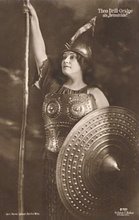The Prima Donna and her fiance, PDF, are getting married at the beginning of September. Or, at least, as of 15 minutes ago, they were. It tends to be subject to interpretation about twice a week.
He's half-Indian (Indian-Indian), half-Moroccan, born in Israel. Think Yul Brynner as Pharoah, and you've got a good idea. He comes from Kiryat Shemona, which is a small town in the north of Israel, notable mostly for having Katyusha rockets dropped on it from time to time. It was built in the 1950s when the Israeli government idealistically thought that putting penniless Jewish refugees from North African countries in out of the way places would lead to the development of the area. What they've got now is a lot of penniless second generation Israelis without work or even much infrastructure in towns that are glorified slums. Many of these development towns depended on a single factory, and since putting a factory far away from its sources of supply and its markets, and near a border with an enemy country doesn't really make for a profitable business, most attempts at industrial development failed pretty fast. In a way it's a shame, because the northern part of Israel is very beautiful. Most of the settlements--kibbutzim and moshavim--in the area have gone into "zimmerim"--wooden holiday cabins with all the amenities, to take advantage of the natural attractions.
PDF and the Prima Donna have been living with us in Jerusalem for the past two years, but the wedding will be in the north because about 80% of the guests--PDF's family--are there. Our side is small, and we don't have a lot of friends to invite. PDF wants to arrange a bus since he also wants to invite quite a few of his police friends, but even so, I think if 50 of the approximately 400 guests come from Jerusalem, that will be a lot.
So far, the Prima Donna has put a deposit on a dress from a bridal salon. In Israel it is unusual to buy a dress; they are usually rented. She will have her makeup and hair done on the day of the wedding in Kiryat Shemona but will take the dress from Jerusalem. Originally both she and PDF wanted to hold the wedding in an outdoor garden (a very popular kind of venue in Israel, which has the climate for it for a good part of the year) but that fell through (chef died of a heart attack--!-- and his replacement, we have heard, isn't very good) and it is now to be in a hall. All arrangements need to be reorganized, with less than two months to go. It is also going to be a lot more expensive. (In Israel, it is not de rigueur for the parents of the bride to pay for the wedding--it's more a collective sort of thing, but in our case, most of the cost is being borne by PDF. Our contribution was letting the couple save rent money for two years by living with us, since we don't have the means to make a large gift. Guests in Israel normally give money as wedding presents, to help defray the wedding expenses. Mizrachim--Jews from Middle Eastern countries--traditionally have gigantic weddings. It's not just that the families are large, but a matter of honor. The Baritone Solo, my husband, comes from an Iraqi family. I'm not even opening my mouth, but frankly, I HATE big weddings)
The Tenor is arriving from NY, having given his sister a very generous sum as a present, and wants to invite all his old army buddies (the DivaF is one) to spend the weekend after the wedding in the north, living it up and rehashing all their "wonderful" memories of Gaza in the second intifada. We also intend to spend the weekend there--those returning via the transport we arrange will not arrive in Jerusalem until about 3 a.m., and the wedding most probably won't be over until then, so we can't possibly return the same night.
So we've been searching the internet for a place with facilities large enough--and luxurious enough--for all of us. It's rapidly becoming "decision by committee" and I'm getting a headache. Everyone has a different, and better, idea. Not only does it require the organization of an army operation, but since we are Jews, three sites, 4 opinions. I'm beginning to hope the couple will just elope and notify us the day after....(to be continued, inshallah)
